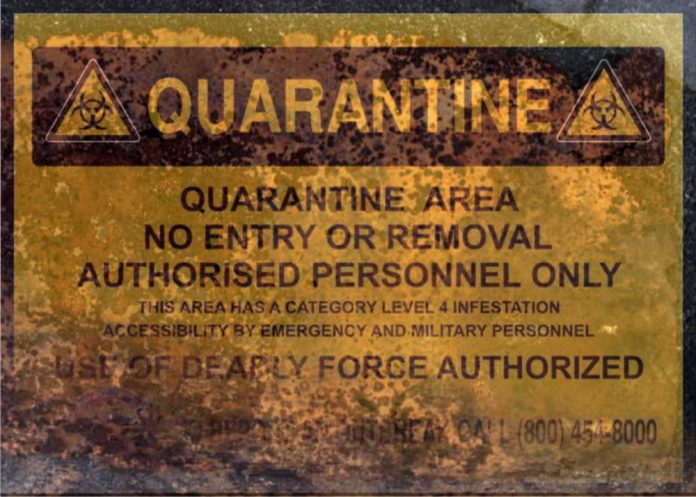Alarming news regarding the CDC, the organization is seeking quarantine powers that would allow the agency to detain anyone in the country with symptoms as minor as a headache. The new rules were proposed on January 19th, 2017 and go into effect this Spring.
The CDC has not updated the quarantine authority rules since the 1940’s, and the update grants the agency more totalitarian control over the public. The outlined changes (see below) are being welcomed by many health lawyers, bioethicists, and public health specialists because they provide valuable tools to protect the citizenry. However, the new regulations could easily be misused and could violate civil liberties.
The New Rules
- Outlines the provisions to reflect input received from individuals, industry, state and federal partners, public health authorities, and other interested parties.
- Does not authorize compulsory medical testing, vaccination, or medical treatment without prior informed consent.
- Requires CDC to advise individuals subject to medical examinations that such examinations will be conducted by an authorized health worker and with prior informed consent.
- Includes strong due process protections for individuals subject to public health orders, including a right to counsel for indigent individuals.
- Does not expand CDC’s authority beyond what is granted by Congress, nor does it alter the list of diseases subject to federal isolation or quarantine, which is established by an
- Executive Order of the President.
- Limits to 72 hours the amount of time that an individual may be apprehended pending the issuance of a federal order for isolation, quarantine, or conditional release.
- Provides the public with explicit information about how and where the CDC conducts public health risk assessments and manages travelers at US ports of entry.
The Final Rule Publication (PDF)
[embeddoc url=”https://www.dropbox.com/s/5zgkbqhi9hvtwz1/2017-00615.pdf?dl=1″ download=”all” viewer=”google”]
The updates were finalized under the Obama administration, literally on the second to last day he was in office, January 19th. The regulations were scheduled to go into effect on February 21st, but the Trump administration is reviewing the changes as part of its consideration of new rules, so the soonest the changes could go into effect has been pushed to the end of March.
Under the rules made in the 1940’s, the CDC could realistically only detain individuals who crossed state or international borders, and the CDC was limited to detaining only those who had one of a few diseases; including cholera, diphtheria, tuberculosis, plague, smallpox and yellow fever.
Under the new regulations, the CDC could detain anyone in the country without getting approval from state and local officials. Also, the agency could seize people to “assess” their health if they are exhibiting symptoms such as high fever, headache, cramps and other common symptoms which could be ‘indicative of a dangerous infectious disease.’
The CDC is notorious for abusing its power and misleading the public. The largest issue to date might possibly be vaccinations. Now, the CDC could potentially detain anyone, anywhere in the country with a headache. However, some legal professionals state that this is a “good thing.”
“Because of the breadth and scope of the definition of ill persons, CDC can target a much wider swath of persons to assess and screen,” says James Hodge Jr., a professor of public health law and ethics at the Sandra Day O’Connor College of Law at Arizona State University.
“The CDC has been operating its infectious disease powers under really antiquated regulations,” says Lawrence Gostin, a professor of global health law at Georgetown University.
On the ‘brighter’ side, there are some who are concerned with the overreach the CDC would gain.
“It could represent a great danger to Americans’ health and civil liberties,” says Wendy Parmet, a health policy lawyer at Northeastern University.
For example, she says, the rules would allow the CDC to hold someone in quarantine for 72 hours before their case is subject to review. And that review would be conducted by the CDC itself instead of an outside, objective entity.
“The concern,” Parmet says, “is that unless these regulations are carried out with care, and by people who [base their actions] on science, they can be used to trammel the civil liberties of Americans.”
The CDC has a long history of distorting facts for profit, for example, the CDC generates $4 Billion in vaccine sales annually, in addition, the FDA and CDC own vaccine patents. That means our government has a vested interest in our children receiving vaccines. If demand decreases then the government, particularly the CDC, loses money. Thus, the government is incentivized to create a demand for vaccines. All the while causing an array of medical problems for the children. Similar tactics and situations could easily be generated and used under the CDC’s new proposed regulations. What say you reader?
Works Cited
Rob Stein. “CDC Seeks Controversial New Quarantine Powers To Stop Outbreaks.” NPR. . (2017): . .
CDC. “Final Rule for Control of Communicable Diseases: Interstate and Foreign.” CDC. . (2017): . .
Dr. Sina McCullough. “Fighting The Vaccine Bullies.” Natural News Blog. . (2017): . .


![[VIDEO] Drag Queen Drag Shows Are Now Infesting Churches](https://christianjournal.net/wp-content/uploads/2019/11/Screenshot-2019-11-22-at-9.02.01-PM-218x150.png)
![[VIDEO] Starbucks Worker Dumps Milkshake On Open Air Preachers Head](https://christianjournal.net/wp-content/uploads/2019/11/Screenshot-2019-11-22-at-7.23.43-PM-218x150.png)
![[VIDEO] Man Arrested For Threatening To Kill Female Abolitionist With Crowbar](https://christianjournal.net/wp-content/uploads/2019/11/MLock-1-218x150.jpg)
![[VIDEO] Drag Queen Drag Shows Are Now Infesting Churches](https://christianjournal.net/wp-content/uploads/2019/11/Screenshot-2019-11-22-at-9.02.01-PM-100x70.png)
![[VIDEO] Starbucks Worker Dumps Milkshake On Open Air Preachers Head](https://christianjournal.net/wp-content/uploads/2019/11/Screenshot-2019-11-22-at-7.23.43-PM-100x70.png)
![[VIDEO] Man Arrested For Threatening To Kill Female Abolitionist With Crowbar](https://christianjournal.net/wp-content/uploads/2019/11/MLock-1-100x70.jpg)


